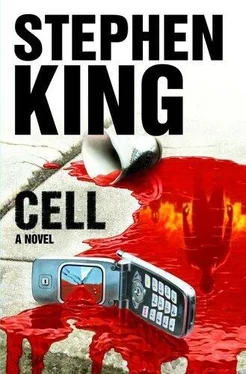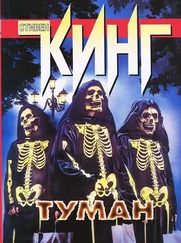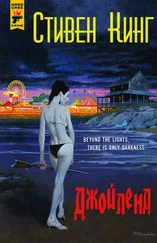He wondered how many people had been trapped over there. Trapped between the fire and the water.
"Remember wondering if a modern city could burn?" Tom McCourt said. In the light of the fire, his small, intelligent face looked tired and sick. There was a smudge of ash on one of his cheeks. "Remember that?"
"Shut up, come on," Alice said. She was clearly distraught, but like Tom, she spoke in a low voice. It's like we're in a library, Clay thought. And then he thought, No— a funeral home. "Can't we please go? Because this is kicking my ass."
"Sure," Clay said. "You bet. How far to your place, Tom?"
"From here, less than two miles," he said. "But it's not all behind us, I'm sorry to say." They had turned north now, and he pointed ahead and to the right. The glow blooming there could almost have been orange-tinted arc-sodium streetlights on a cloudy night, except the night was clear and the streetlights were now out. In any case, streetlights did not give off rising columns of smoke.
Alice moaned, then covered her mouth as if she expected someone among the silent multitude watching Boston burn might reprimand her for making too much noise.
"Don't worry," Tom said with eerie calm. "We're going to Maiden and that looks like Revere. The way the wind's blowing, Maiden should still be all right."
Stop right there, Clay urged him silently, but Tom did not.
"For now," he added.
2
There were several dozen abandoned cars on the lower deck of the span, and a fire truck with EAST BOSTON lettered on its avocado-green side that had been sideswiped by a cement truck (both were abandoned), but mostly this level of the bridge belonged to the pedestrians. Except now you probably have to call them refugees, Clay thought, and then realized there was no them about it. Us. Call us refugees.
There was still very little talk. Most people just stood and watched the city burn in silence. Those who were moving went slowly, looking back frequently over their shoulders. Then, as they neared the far end of the bridge (he could see Old Ironsides —at least he thought it was Old Ironsides —riding at anchor in the Harbor, still safe from the flames), he noticed an odd thing. Many of them were also looking at Alice. At first he had the paranoid idea that people must think he and Tom had abducted the girl and were spiriting her away for God knew what immoral purposes. Then he had to remind himself that these wraiths on the Mystic Bridge were in shock, even more uprooted from their normal lives than the Hurricane Katrina refugees had been—those unfortunates had at least had some warning—and were unlikely to be capable of considering such fine ideas. Most were too deep in their own heads for moralizing. Then the moon rose a little higher and came out a little more strongly, and he got it: she was the only adolescent in sight. Even Clay himself was young compared to most of their fellow refugees. The majority of people gawking at the torch that had been Boston or plodding slowly toward Maiden and Danvers were over forty, and many looked eligible for the Golden Ager discount at Denny's. He saw a few people with little kids, and a couple of babies in strollers, but that was pretty much it for the younger set.
A little farther on, he noticed something else. There were cell phones lying discarded in the roadway. Every few feet they passed another one, and none were whole. They had either been run over or stomped down to nothing but wire and splinters of plastic, like dangerous snakes that had been destroyed before they could bite again.
3
" What's your name, dear?" asked a plump woman who came angling across to their side of the highway. This was about five minutes after they had left the bridge. Tom said another fifteen would bring them to the Salem Street exit, and from there it was only four blocks to his house. He said his cat would be awfully glad to see him, and that had brought a wan smile to Alice's face. Clay thought wan was better than nothing.
Now Alice looked with reflexive mistrust at the plump woman who had detached herself from the mostly silent groups and little lines of men and women—hardly more than shadows, really, some with suitcases, some carrying shopping bags or wearing backpacks—that had crossed the Mystic and were walking north on Route One, away from the great fire to the south and all too aware of the new one taking hold in Revere, off to the northeast.
The plump woman looked back at her with sweet interest. Her graying hair was done in neat beauty-shop curls. She wore cat's-eye glasses and what Clay's mother would have called a "car coat." She carried a shopping bag in one hand and a book in the other. There seemed to be no harm in her. She certainly wasn't one of the phone-crazies—they hadn't seen a single one of those since leaving the Atlantic Avenue Inn with their sacks of grub—but Clay felt himself go on point, just the same. To be approached as if they were at a get-acquainted tea instead of fleeing a burning city didn't seem normal. But under these circumstances, just what was? He was probably losing it, but if so, Tom was, too. He was also watching the plump, motherly woman with go-away eyes.
"Alice?" Alice said at last, just when Clay had decided the girl wasn't going to reply at all. She sounded like a kid trying to answer what she fears may be a trick question in a class that's really too tough for her. "My name is Alice Maxwell?"
"Alice," the plump woman said, and her lips curved in a maternal smile as sweet as her look of interest. There was no reason that smile should have set Clay on edge more than he already was, but it did. "That's a lovely name. It means 'blessed of God.' "
"Actually, ma'am, it means 'of the royalty' or 'regally born,' " Tom said. "Now could you excuse us? The girl has just lost her mother today, and—"
"We've all lost someone today, haven't we, Alice?" the plump woman said without looking at Tom. She kept pace with Alice, her beauty-shop curls bouncing with every step. Alice was eyeing her with a mixture of unease and fascination. Around them others paced and sometimes hurried and often plodded with their heads down, little more than wraiths in this unaccustomed darkness, and Clay still saw nobody young except for a few babies, a few toddlers, and Alice. No adolescents because most adolescents had cell phones, like Pixie Light back at the Mister Softee truck. Or like his own son, who had a red Nextel with a ring-tone from The Monster Club and a teacher workamommy who might be with him or might be just about anyw—
Stop it. Don't you let that rat out. That rat can do nothing but run, bite, and chase its own tail.
The plump woman, meanwhile, kept nodding. Her curls bounced along. "Yes, we've all lost someone, because this is the time of the great Tribulation. It's all in here, in Revelation." She held up the book she was carrying, and of course it was a Bible, and now Clay thought he was getting a better look at the sparkle in the eyes behind the plump woman cat's-eye glasses. That wasn't kindly interest; that was lunacy.
"Oh, that's it, everybody out of the pool," Tom said. In his voice Clay heard a mixture of disgust (at himself, for letting the plump woman bore in and get close to begin with, quite likely) and dismay.
The plump woman took no notice, of course; she had fixed Alice with her stare, and who was there to pull her away? The police were otherwise occupied, if there were any left. Here there were only the shocked and shuffling refugees, and they could care less about one elderly crazy lady with a Bible and a beauty-shop perm.
"The Vial of Insanity has been poured into the brains of the wicked, and the City of Sin has been set afire by the cleansing torch of Yee- ho -vah!" the plump lady cried. She was wearing red lipstick. Her teeth were too even to be anything but old-fashioned dentures. "Now you see the unrepentant flee, yea, verily, even as maggots flee the burst belly of—"
Читать дальше








